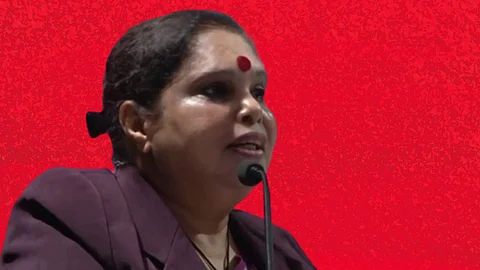

The Hema Committee Report on workplace harassment faced by women in the Malayalam film industry, released to RTI applicants on Monday, August 19, hints that there could be one or more minors among those who recalled their experience of sexual harassment before the Committee.
Referring to the depositions on sexual harassment made by respondents before the Committee, the report, in several instances, uses the phrase “girls/women”. This differential choice of words – girls and women – points to the possibility that one or more of the survivors who spoke to the Committee about sexual harassment was/were minor.
“We noticed in the beginning that the girls/women were very hesitant to divulge their experiences even to the committee about sexual harassment in cinema. We realised that the reason was not merely womanly embarrassment but they were scared that they will be harmed by the perpetrators, in case the information reaches their ears. Therefore, we gave the witnesses assurance that absolute confidentiality will be maintained in the proceedings,” reads the report.
Further, under a section titled “Compromise, adjustment, and casting couch”, the Committee mentions how harassment starts from the stage of soliciting work for women in the film industry. Here also, the phrase “woman/girl” is used.
“It is revealed from the statements of various witnesses who were examined before the committee that production controller or whoever gives an offer for role in cinema first approaches the woman/girl or if it is the other way and, a woman approaches any person in cinema seeking a chance in cinema, she is told that she has to make "adjustments" and "compromise" to take her in cinema. "Compromise" and "adjustment" are two terms which are very familiar among women in the Malayalam film industry and they are asked to make herself available for sex on demand,” the report cites.
In a specific paragraph right after, the report omits the word “women” and uses “girl”. It reads, “The girl also told that demand for sex can be made by anybody in the cinema– actor, producer, director, production controller or any other person and a woman must be willing to surrender to their demands. Referring to certain well-known actresses who are successful in the industry, women in cinema are convincingly told that such women have all gained reputation, money and fame only because they were willing to adjust and compromise'. She is also told that if she wanted to get a chance to act in cinema and grow to heights, she will have to make certain "adjustments" and "compromises"".
The repeated usage of differential terms like women and girls suggests that there could be one or more among those who recounted their traumatic experiences before the Committee. It is difficult to ascertain the specifics of this since the report has been redacted to omit individual statements and names to protect the privacy of survivors. But the language does point towards the possibility that the film industry is an unsafe work environment not just for women, but also children.
The report also says, “ Though evidence before us discloses several sexual acts which are committed against women in cinema mostly constitute various offences under the Indian Penal Code and also fall under definition of The Sexual Harassment of Women at Workplace (Prevention, Prohibition and Redressal) Act (POSH Act, for short) etc., the women in cinema who suffer the atrocities prefer to keep silence, while thinking about the serious consequences which they may face if they make any complaint about the atrocities in cinema.”
This raises questions as to why the Committee did not report these crimes to the police, considering that such depositions by survivors point towards cognisable offences that can be investigated by the police without a warrant or prior permission of the court.
The Hema Committee, headed by former High Court judge K Hema, was formed in the aftermath of the sexual assault of a female actor in a moving car in Kerala’s Kochi in 2017. Though the Committee submitted an inquiry report to the Kerala government in 2018, it remained unpublished. Earlier this year, the State Information Commission (SIC) ordered it to be released to RTI applicants after taking down names and identifying details of survivors. The redacted version of the report says that the Committee has based its findings on direct evidence from individuals who spoke in person, and not hearsay.